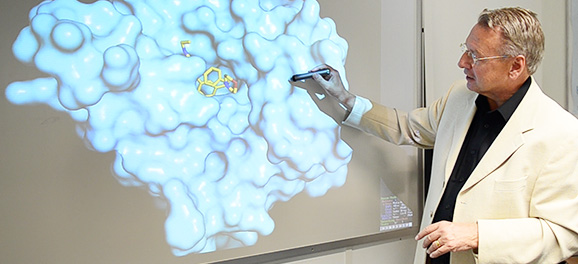
In a collaboration with the University of Sussex, Professor Paul Workman and his team uncovered a hidden mechanism revealing how a class of cutting-edge cancer drugs attack tumours. They hope that the drugs, known as protein kinase inhibitors, could keep patients alive for longer.
Protein kinase inhibitors are some of the most heralded of the new kind of targeted therapies, with 25 already in use and around 400 under development. They treat 5,000-10,000 patients in the UK each year, with that number set to grow as more are approved for use. Kinase inhibitors work across types of breast, skin, lung, kidney and other cancers, but while effective often only extend life by around three to six months. After uncovering the previously hidden mechanism of action, scientists believe they can unlock the true potential of the drugs by changing the way they are used.
It had been thought that the drugs work solely by blocking the cell signalling function of enzymes called protein kinases – which play an active role in many cancers – by preventing them from binding to ATP, the basic unit of energy in cells. But this new major discovery has found that at high doses, the drugs also block kinases from linking up with a complex of molecules in cells called the Hsp90-Cdc37 chaperone system, which is essential for maintaining the stability of proteins. The team showed that this 'chaperone deprivation' actually caused the destruction of the cancer-causing kinases and halted the growth and division of cancer cells.
The researchers now plan to conduct clinical trials using kinase inhibitors at higher doses but with rest periods to take advantage of the new mechanism – and believe the new method has the potential to keep cancers at bay for much longer.
Professor Workman, who is Deputy Chief Executive of the ICR and Director of our Cancer Research UK Cancer Therapeutics Unit, said: "We hope to carry out clinical trials to test the benefits of delivering kinase inhibitors in a way that should maximise their impact in destroying their targets. There is more work to do to prove the benefit to patients, but these drugs are already approved so there are fewer regulatory burdens than usual to overcome to test our new idea. Our results also support ongoing and future clinical trials in which we combine protein kinase drugs with HSP90 inhibitors – such as the drug we discovered AUY922 – to maximize the chaperone deprivation effect."